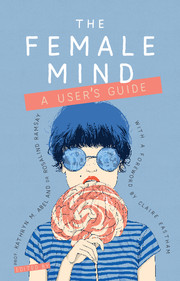Book contents
- Frontmatter
- Acknowledgements
- Contents
- Foreword
- Introduction: being female
- Part I Women in perspective
- 1 The history of the ‘female mind’
- 2 Gender-informed responses to women's distress
- 3 Female sexuality
- 4 Growing up female
- Part II Women and society
- Part III Women and their environment
- Part IV Women and specific disorders
- Part V Women and treatment
- Contributors
- Index
4 - Growing up female
from Part I - Women in perspective
Published online by Cambridge University Press: 02 January 2018
- Frontmatter
- Acknowledgements
- Contents
- Foreword
- Introduction: being female
- Part I Women in perspective
- 1 The history of the ‘female mind’
- 2 Gender-informed responses to women's distress
- 3 Female sexuality
- 4 Growing up female
- Part II Women and society
- Part III Women and their environment
- Part IV Women and specific disorders
- Part V Women and treatment
- Contributors
- Index
Summary
‘It is the hour of the stranger. Let the stranger now enter the soul.’
– D. H. Lawrence (1923)It is over 90 years since D. H. Lawrence gave this eloquent evocation of the ordinary, yet extraordinary, impact of puberty on the personality and the ensuing course of adolescence. Yet adolescence remains the ‘hour of the stranger’, when the personality painfully develops into its adult self. Lawrence does not make gender distinctions, but there are significant differences between growing up female and growing up male. Below are some comments from girls attending a specialist adolescent clinic.
• ‘I cannot bear mental pain.’
A 17-year-old, whose left arm, covered with scratches and scars, told a desperate story, physical evidence of her inner psychological pain that she needed to inscribe on her own body in an attempt to get rid of inner, unbearable tension.
• ‘I feel depressed and unlikeable. Basically, I hate my looks. I'm fat and ugly. I don't smile anymore – only when I puff or get drunk.’
A 14-year-old with anorexia.
• ‘I didn't feel wanted at home. I was always rowing with my mum and her new boyfriend. I suppose I just wanted someone to love me unconditionally – someone I could love too.’
A pregnant 15-year-old.
• ‘I wake up in a panic most nights. The exam pressure is impossible. I just want to cry all the time. It's hopeless.’ An 18-year-old.
Each of these statements is a powerful expression of the intensities of adolescent pain and confusion, and of the often unstoppable urge to act, or act out – that is, to attempt to manage internal conflict by action, rather than by thinking or feeling. Girls tend to act against themselves, as a result of intellectual pressure, depression, poor body image, lack of self-esteem and separation anxiety (this last taking the form of a fear of rejection). The statements describe responses to unmanageable states of mind, and the problems they describe will be familiar to many.
What happens in the mind (the internal world) cannot be separated from what happens in the body and external world.
- Type
- Chapter
- Information
- The Female MindUser's Guide, pp. 23 - 28Publisher: Royal College of PsychiatristsPrint publication year: 2017



